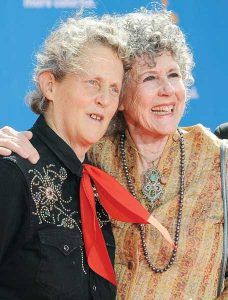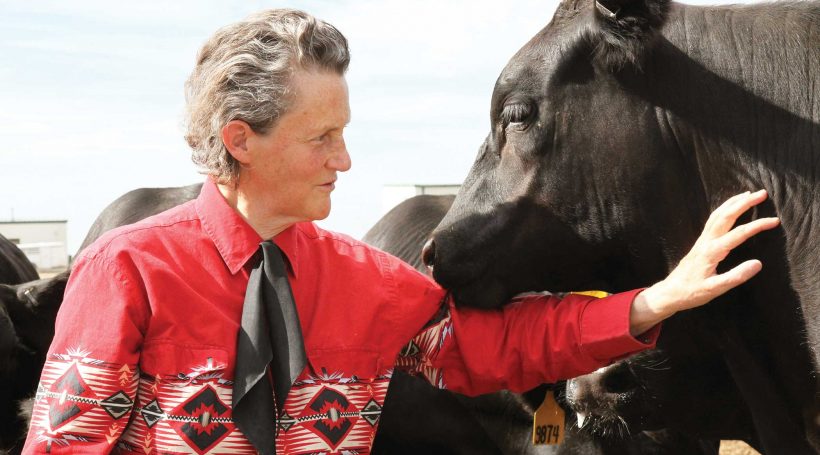Temple Grandin did not speak until she was 4 years old. Today, she delivers lectures to packed crowds at universities and conferences. The 67-year-old is one of the country’s foremost animal science scholars, a prolific author, a university professor and, arguably, the most famous living person with autism.
Grandin will bring her expertise to SJ this month, when she receives Durand, Inc.’s first-ever Dr. Durand Schulmann Award for Excellence in the field of autism.
“When I was an age when most children are talking and communicating, I would just sit and rock back and forth,” Grandin remembers. “I had severe autistic behaviors. I can remember the huge frustration of not being able to express my needs, and when I did get vocal, I was very slow to catch up.”
Grandin was born in Boston, and she says her 1950s upbringing, coupled with her mother’s determination that she receive an education, built the foundation for her future in academia.
“Fortunately, my mother started out with some great advice from a neurologist and a speech pathologist,” Grandin says. “She got me into programs to develop my communication and logic skills. I also had an old-fashioned 1950s upbringing. Manners were taught in a systematic way – every child was taught social skills. I had to be taught those skills like I was learning the social norms of a foreign country, but I learned to shake hands and to make conversation.”
Middle school and high school were difficult years for Grandin. She was bullied by her peers and experienced extreme bouts of social anxiety. After graduating from a private school for gifted children in New England, Grandin earned a bachelor’s degree in psychology from Franklin Pierce College in 1970, followed by master’s and doctoral degrees in animal science from Arizona State University and the University of Illinois, respectively.
Grandin’s biggest claim to fame is the work she’s done to change the meat processing industry, advocating for more humane methods of slaughter. She redesigned slaughter facilities, and today more than half of all U.S. cattle are moved through restraint chutes she invented. The chutes, along with Grandin’s curved cattle lanes, are designed to calm the animals prior to slaughter. Her handiwork inspired the BBC documentary “The Woman Who Thinks Like a Cow,” a title that Grandin sees as an accurate assessment.
“Not everybody on the autism spectrum is a visual thinker, but I am,” she says. “Animals don’t think in words, they think in specific images. They’re sensory-based thinkers. That’s me – everything in my mind is a picture.”
 Grandin first publicly explained her manner of thinking in the mid-80s at an Autism Society of America conference. She quickly became a sought-after speaker in the autism community for her keen ability to give parents insight into their children’s behavior.
Grandin first publicly explained her manner of thinking in the mid-80s at an Autism Society of America conference. She quickly became a sought-after speaker in the autism community for her keen ability to give parents insight into their children’s behavior.
“I get a lot of questions about speech, about teaching social skills,” she says. “Parents tell me, ‘My child has this or that,’ and I don’t care. I don’t even care about the diagnosis. When I talk to a parent I say, ‘OK, how old? How much talking does he do? How does he do in school? What’s he good at, what’s he terrible at? Does he have friends?’ Sometimes we need to just forget about the autism.”
The Centers for Disease Control and Prevention reported in 2014 that autism rates are on the rise. Based on the data, one in 68 children in the United States has an autism spectrum disorder, an increase of roughly 30 percent from the 2012 estimate of one in 88 children. Grandin associates those growing numbers with a widening of the autism spectrum.
“I think a lot of the increase in diagnosis is in the real mild cases,” she says. “I see a lot of kids we used to just call geeks and nerds being diagnosed. The problem now is you can’t get access to services without a diagnosis, so parents need that. This is the problem with the diagnosis of just ‘autism;’ you have one kid who should be working with a tech company and another who can’t talk or dress themselves. The spectrum is so big.”
Grandin believes mild autism should not be cured, but that parents and educators should foster skills in the areas where a child with autism excels. The danger, she warns, is in creating a stigma for otherwise capable children as a result of diagnosis. She points to artists and thinkers who displayed characteristics of autism but who may not have become successful if they’d been diagnosed.
“The milder forms of autism, you don’t want to cure. You wouldn’t have anyone to work in Silicon Valley if you did that,” she says. “I think a brain can be made more thinking or made more social and emotional. Sometimes when you take out the social circuits, you get circuits for other lines of thinking. Look at Mozart, Einstein and Steve Jobs; that’s part of normal variation. But now people like them get labeled with a handicap, and suddenly they’re going nowhere. I want to see those kids in jobs, in successful careers. I want to see the kid, not the label.”
Grandin says the best way to shape a successful future for a child with autism is to focus on real-world experience and an education in work and social skills.
“I’d like to see these kids’ talents developed,” she says. “It makes me sick that these smart kids are ending up in basements playing video games. One of the big problems I’m seeing is not learning working skills. Boy, I wish paper routes still existed. My mother had me working at 13, hemming dresses for women in the neighborhood. At 15 I was cleaning horse stalls. Today, I’m seeing too many kids graduating from high school and college without ever having had a job. These kids get over-coddled, and they’re not learning basic things like shopping. It can be as simple as taking your kid shopping and telling them they have to check out on their own. I’m seeing 18-year-old kids who have never shopped for groceries.”
When she’s not instructing full classes of students at Colorado State University, Grandin manages a grueling schedule of lectures, book tours and consultations at meat-processing plants across the country. She has never married and freely admits to having a stronger emotional connection to animals than to other people.
“When I see people abusing animals it makes me so mad,” she says. “It’s totally stupid to say they don’t have emotions, because they’ve got the same central cortex we have. That’s completely factual in a neurological sense. They feel fear and anxiety, and they remember those feelings. If you hit a dog and you’re wearing Nike shoes, he might associate Nike shoes with being hit. It’s so terrible to do that to an animal whose logical brain has way less computer power than yours.”
At an age when other professionals begin to consider cutting back on work, Grandin feels an obligation to continue traveling and speaking about her experiences. While she’s been well-known in the autism community for decades, she became something of a household name in 2010, when Claire Danes starred in the semi-biographical movie “Temple Grandin.” The film won five Emmy Awards, and Danes won a Golden Globe for her portrayal.
“I consider all this attention a huge responsibility,” Grandin says. “There are a lot of kids who look up to me, and I want to motivate them to succeed. I think that’s true for all older people, whether they’re famous or not. I just talked to a group of retirees in Palo Alto, and I told them they’ve got to go and be mentors. I said, ‘You’ve done the cruises and the cooking classes, now why don’t you go find some kids to help? You just spent a lifetime learning. Go share what you know.’”
Today, Grandin, in her standard uniform of western shirt and cowboy boots, is a welcome sight in cattle yards and slaughterhouses, but she says her acceptance into the male-dominated industry was hard-won.
“The main thing I had to fight was not my autism,” she says. “It was being a woman. At cattle ranches and in meat packing places, it’s all men. They’d look at me, and they wouldn’t say, ‘Why is she here? She’s autistic.’ They’d say, ‘Why is she here? She’s a woman.’”
Grandin hopes her continued success will demonstrate to young women, both on and off the autism spectrum, that they can pursue any career despite their perceived limitations and regardless of their gender.
“You have to remember that you’re selling your work, not yourself,” she says. “When I was young, I was socially awkward, reclusive and anxious. I don’t think anybody would have hired me because of who I was. But I know what I’m doing and I’m good at what I’m doing, and in the end, your work speaks for itself.”












